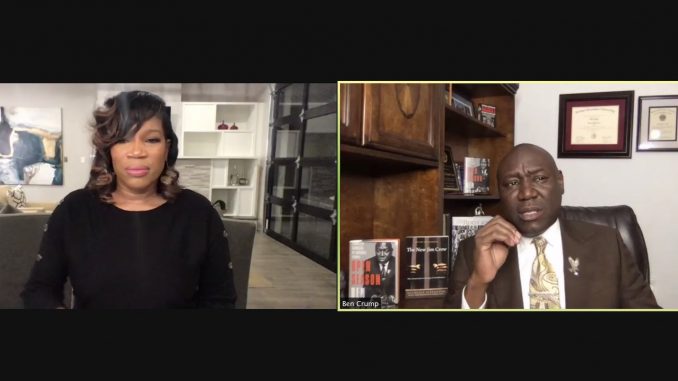
Ben Crump remembers the call he received from Tracy Martin following the killing of his son Trayvon Martin in 2012.
“I still to this day cannot describe the sound that I heard. I mean it was the sound of just brokenheartedness, just despair,” said Crump, who represented Martin’s family in court. “It was so clear to me that person, who was telling me about his seventeen-year-old son who I would come to know as Trayvon Martin, just deeply, deeply loved his son.”
Crump, a prominent lawyer who also represented the family of Breonna Taylor, a Black woman killed by police in March, discussed systemic racism and police brutality with LaToya Stroman, a 2012 broadcasting, telecommunications and mass media alumna, on her talk show “A Seat At the Table” on Tuesday evening for this year’s homecoming. A group of approximately 200 Temple University students and alumni virtually attended the event which was presented by the Los Angeles Chapter of the Temple University Alumni Association and the Temple University Black Alumni Alliance. .
Stroman met Crump at the March on Washington 2020 on Aug. 31 and wanted to continue their conversation in a way that others could be involved. Her show, which first aired in March, kicked off the second season with Tuesday’s event.
At the event Tuesday, Stroman and Crump talked about issues surrounding racism, police, white supremacy and the importance of educating young Black people to stand up for themselves and vote.
“We have to build them up and remind them that they’re existence on this earth will not be defined by a racist criminal justice system that targeted them from birth because of the vestiges of slavery,” Crump said. “If we don’t, we would have an entire generation of people who look like us who would be defined by this racist system.”
Stroman and Crump also discussed the prevalence of white supremacist instances in President Donald Trump’s refusal to denounce white supremacy groups in North Carolina in 2017 and at the presidential debate on Sept. 29.
It is not up to Black people to end white supremacy, Crump said.
“Our white brothers and sisters are the only ones who can stop white supremacy,” he added. “They have to believe in the preamble to the Declaration of Independence. I know they can quote it, but the question is, do they really believe it?”
Amir Sapp, a sophomore computer science major, attended the event because he was interested in hearing Crump talk about the judicial system. The event made him reflect on how often Black people in America are killed unjustly, he said.
“I just started thinking about how often this has been happening with Black men and women being killed by the police, and that just because a couple of them have been brought to the global stage,” Sapp added. “There’s a lot that happen all the time that no one talks about.”
Because the criminal justice system is inherently racist, there is no Black child who is immune to racial profiling, Crump said.
”I don’t care what ZIP code you live in, I don’t care what the index of your salary is, I don’t care what title you have, none of your children are immune,” Crump said. “We can all be profiled by this racist criminal justice system so fast it can make your head spin.”
Stroman said that hosting shows and conversations through “A Seat at the Table” has given her the ability to talk to many different people, but her discussion with Crump gave her the ability to further promote her activism and elevate the conversation about racial injustice.
“The more that we talk about it, the more that we put it out there, the more that we demand justice, the more that we get more people doing something about it, then we will actually get justice,” she added. “But if we’re quiet and we don’t say anything, then nothing’s going to happen.”



Be the first to comment